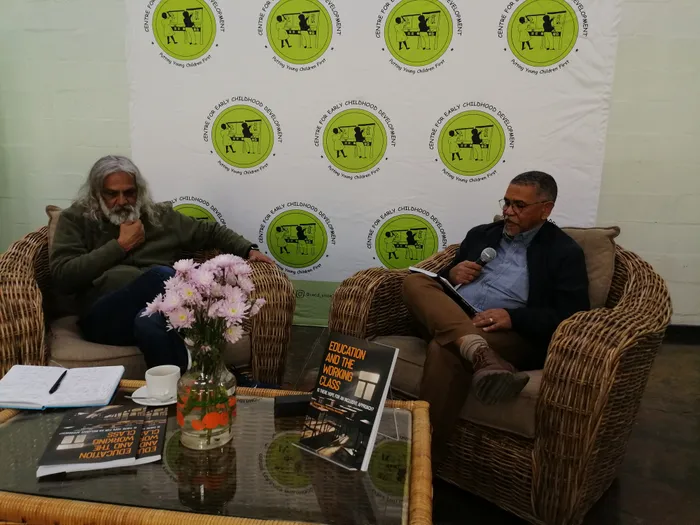‘Education system is based on money, power, politics’

The author of Education and the Working Class: Is there hope for an inclusive approach?, Sigamoney Naicker, left, was interviewed by Peter Present at the book launch in Athlone.
Power and greed are the foundation stones of South Africa’s education system, which should be overhauled to better provide for children from poorer communities, says education expert Sigamoney Naicker.
Professor Naicker, a lecturer in specialised education in UWC’s department of educational psychology, launched his book, Education and the Working Class: Is there hope for an inclusive approach?, at the Centre for Early Childhood Development in Athlone, on Thursday September 5.
Activist Peter Present interviewed Professor Naicker about the book, which delves into why so many working-class and vulnerable children struggle within the education system.
Professor Naicker argues the current system is designed around the middle class and overlooks the reality of the poor and marginalised, and with a true commitment to social justice lacking, the education system continues to fail them.
The book scrutinises the existing bureaucracy, calling for reformed teams that combine multidisciplinary knowledge with strong project management skills.
Professor Naicker proposes a new social justice model for educational planning. Among other things, the book suggests restructuring the foundation phase to focus on socio-emotional development, and it emphasises the need to compensate for a lack of social and cultural capital among vulnerable children.
Asked why the book was needed 30 years after democracy, Professor Naicker said the current school curriculum was not inclusive, especially of disabled or impaired pupils, resulting in many children still not being able to read and often dropping out of school.
He said that in 2006, when he saw the results of literacy and numeracy in Grade 12 in the Western Cape, he was shocked. Children who grew up in townships were performing so poorly, he knew that he had to write about it - to start a conversation around inclusive education.
“I looked at education theories related to problems in the Western Cape, which is quite severe and challenging. I went around in the province and spoke to principals and parents who told me very painful stories. They struggled with their children, didn't have money to pay fees, had older children on drugs. Those things affected me quite badly. I knew that I had to publish my book because the education system in South Africa is based on money, power, and politics.”
Professor Naicker said education was vital for our society, but we had created an institution that had very little connection with people who struggled in the world.
Love and passion instead of greed and power should motivate those creating the education system, he said.
“In Hanover Park, a principal said young boys leave school early and die before they turn 30 because they become gangsters. The principal said that the community the school is in have no interest in education, and only come to school on a weekend to steal.”
Children needed psycho-social support, mentoring, and funding, he said, adding that there was a dissonance between what was happening on the ground and discussions in the education department.
“We need to develop a curriculum that gives teachers tools to interact with children. So many kids are passing at 30% that's why they can't get jobs. I want to start a debate for children of the future. Working class communities are so distant from the narrative of the province. Nobody says a word about the literacy levels in the country. How is it possible that you can have a curriculum for 30 years and it is still not suited to majority of the people?”
Education and the Working Class: Is there hope for an inclusive approach? is available through Takealot for R367. For more information, call Professor Naicker on 082 786 1398.
